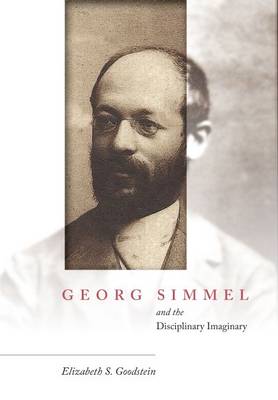
Stock image for illustration purposes only - book cover, edition or condition may vary.
Georg Simmel and the Disciplinary Imaginary
Elizabeth S. Goodstein
€ 46.30
FREE Delivery in Ireland
Description for Georg Simmel and the Disciplinary Imaginary
Paperback. Integrating intellectual biography, philosophical interpretation, and a critical examination of the history of academic disciplines, this book restores philosopher Georg Simmel to his rightful place as a major figure and challenges the frameworks through which his contributions to modern thought have been at once remembered and forgotten Num Pages: 384 pages. BIC Classification: 1DFG; 3JH; 3JJ; HPCD1; HPCF. Category: (G) General (US: Trade). Dimension: 180 x 253 x 30. Weight in Grams: 728.
An internationally famous philosopher and best-selling author during his lifetime, Georg Simmel has been marginalized in contemporary intellectual and cultural history. This neglect belies his pathbreaking role in revealing the theoretical significance of phenomena-including money, gender, urban life, and technology-that subsequently became established arenas of inquiry in cultural theory. It further ignores his philosophical impact on thinkers as diverse as Benjamin, Musil, and Heidegger. Integrating intellectual biography, philosophical interpretation, and a critical examination of the history of academic disciplines, this book restores Simmel to his rightful place as a major figure and challenges the frameworks through which his contributions to modern thought have been at once remembered and forgotten.
Product Details
Publisher
Stanford University Press
Format
Paperback
Publication date
2017
Condition
New
Weight
728 g
Number of Pages
384
Place of Publication
Palo Alto, United States
ISBN
9781503600737
SKU
V9781503600737
Shipping Time
Usually ships in 7 to 11 working days
Ref
99-50
About Elizabeth S. Goodstein
Elizabeth S. Goodstein is Professor of Liberal Arts at Emory University and the author of the award-winning Experience without Qualities: Boredom and Modernity (Stanford, 2005).
Reviews for Georg Simmel and the Disciplinary Imaginary
Goodstein has written a truly important book on Simmel and his place on the margins of the discipline of sociology, but beyond this I think she has also produced an equally important work on the need to think differently in a world defined by hyper-connectivity and what Simmel called infinite reciprocity.
Mark Featherstone
Theory, Culture and Society
Anyone interested in understanding the character - and especially the fate - of Simmel's thought would do well to consult Elizabeth Goodstein's Georg Simmel and the Disciplinary Imaginary.
Paul Reitter
Times Literary Supplement
The most important study of philosopher George Simmel to ever appear in English, this book does more than contribute to our understanding of a major modern thinker: it offers a fascinating analysis of knowledge formation at the turn of the twentieth century and is a crucial addition to our understanding of Western modernity itself.
Michael Jennings
Princeton University
Georg Simmel and the Disciplinary Imaginary is remarkable for its breadth of knowledge, its philosophical discernment, and its sophisticated approach to the complexity of both Simmel's work and our own contemporary existence.
Patrice Petro
UC Santa Barbara.
Mark Featherstone
Theory, Culture and Society
Anyone interested in understanding the character - and especially the fate - of Simmel's thought would do well to consult Elizabeth Goodstein's Georg Simmel and the Disciplinary Imaginary.
Paul Reitter
Times Literary Supplement
The most important study of philosopher George Simmel to ever appear in English, this book does more than contribute to our understanding of a major modern thinker: it offers a fascinating analysis of knowledge formation at the turn of the twentieth century and is a crucial addition to our understanding of Western modernity itself.
Michael Jennings
Princeton University
Georg Simmel and the Disciplinary Imaginary is remarkable for its breadth of knowledge, its philosophical discernment, and its sophisticated approach to the complexity of both Simmel's work and our own contemporary existence.
Patrice Petro
UC Santa Barbara.
